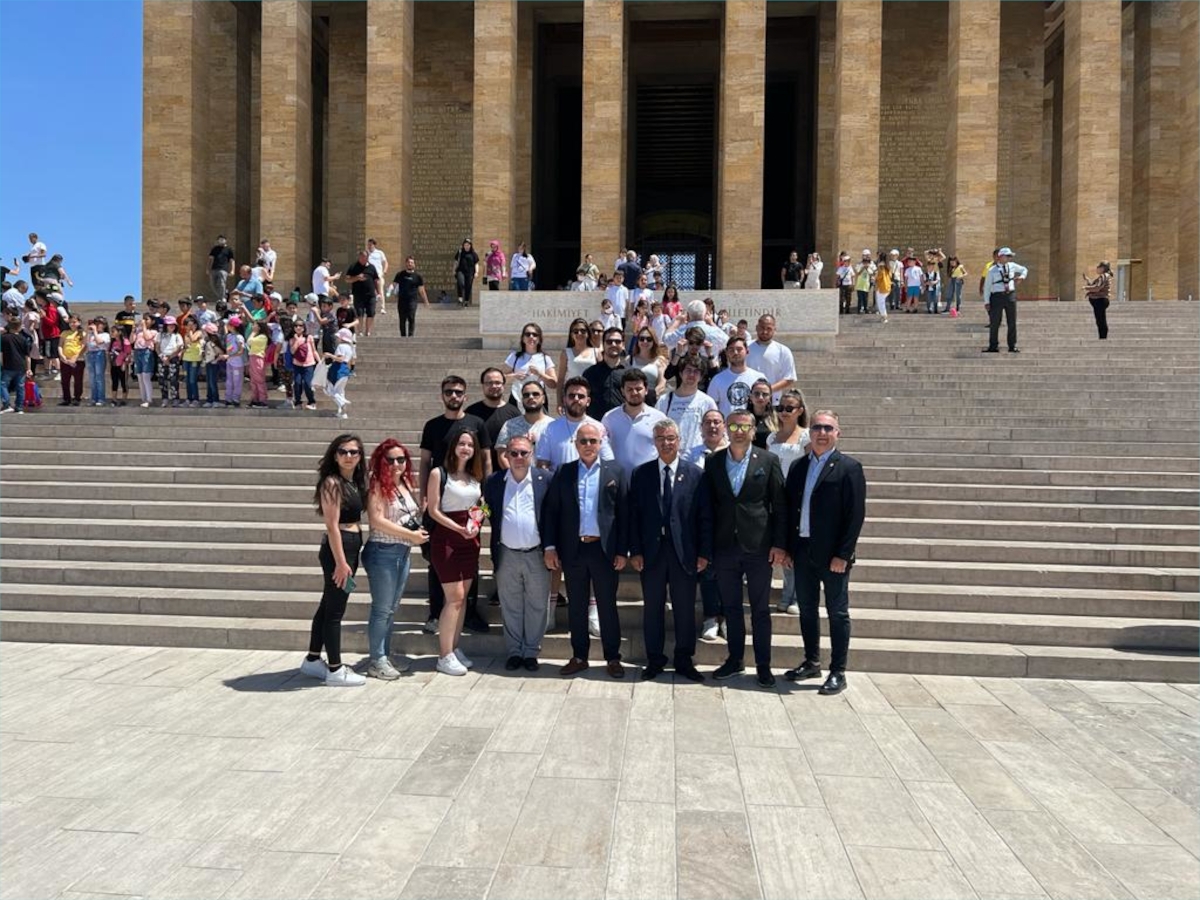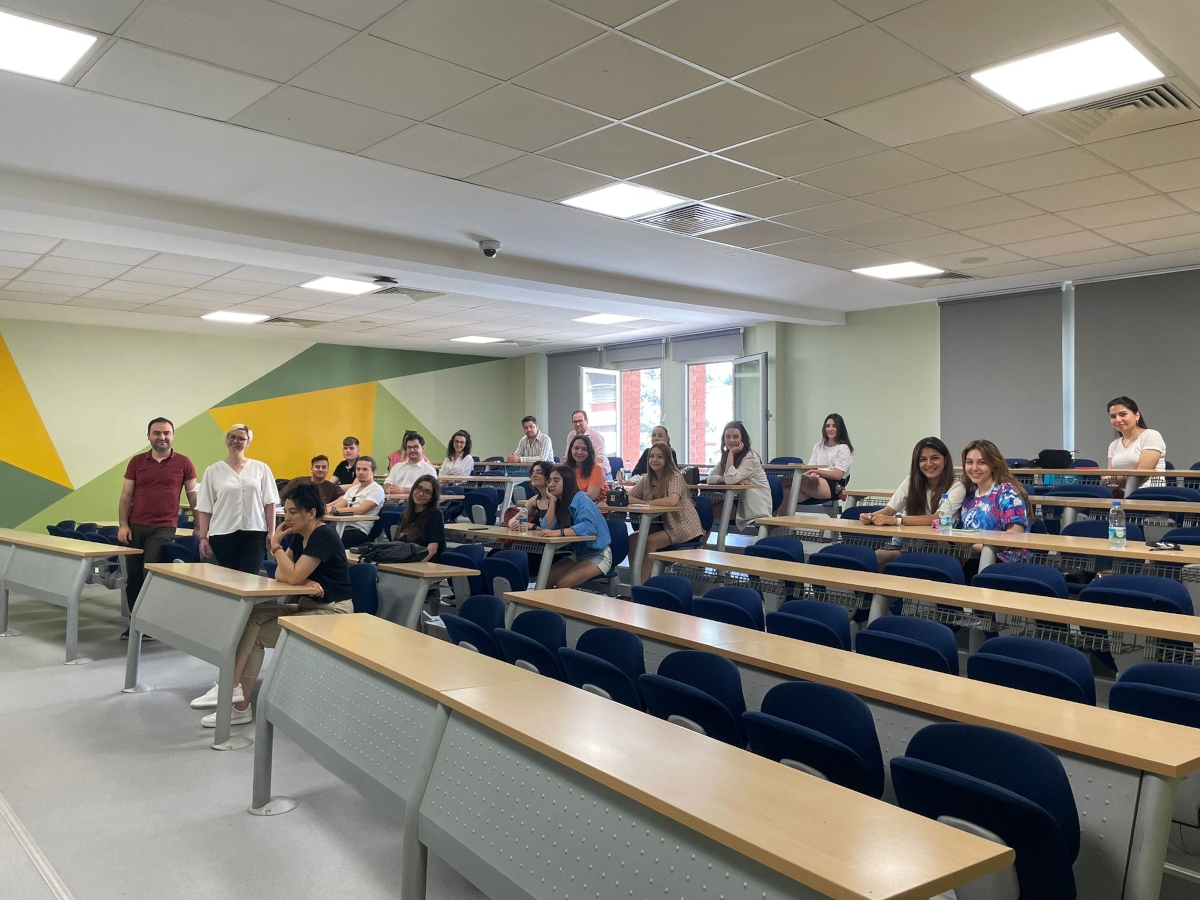
...

...

...
VOCATIONAL SCHOOL OF HEALTH SERVICES
Department of Opticianry| Course Name |
Communication in Health Services
|
|
Code
|
Semester
|
Theory
(hour/week) |
Application/Lab
(hour/week) |
Local Credits
|
ECTS
|
|
TS 104
|
Fall/Spring
|
1
|
2
|
2
|
4
|
| Prerequisites |
None
|
|||||
| Course Language |
Turkish
|
|||||
| Course Type |
Elective
|
|||||
| Course Level |
Short Cycle
|
|||||
| Mode of Delivery | - | |||||
| Teaching Methods and Techniques of the Course | DiscussionGroup WorkCase StudyCritical feedbackLecture / PresentationField work/Application | |||||
| National Occupation Classification | - | |||||
| Course Coordinator | ||||||
| Course Lecturer(s) | ||||||
| Assistant(s) | - | |||||
| Course Objectives | This course aims to teach the students; the basic features of communication,; understand her/himself and the others and learn what to do to communicate effectively with people and patient |
| Learning Outcomes |
The students who succeeded in this course;
|
| Course Description | This course is about health workers’ communication skills. The subjects include open communication, verbal and nonverbal communication, empathy, active listening, communication with difficult patients and their relatives, team communication in the work environment, and ethical principles. |
| Related Sustainable Development Goals |
|
|
Core Courses | |
| Major Area Courses | ||
| Supportive Courses | ||
| Media and Management Skills Courses | ||
| Transferable Skill Courses |
| Week | Subjects | Related Preparation |
| 1 | Introduction to the course Introduction to the communication | |
| 2 | Contexts of Communication Intrapersonal communication: Who am I? | Marziye İlhan (2018) Sağlık çalışanlarının iletişimi, İstanbul: Beta Yayınları ss. 178-183 |
| 3 | Verbal Communication | Marziye İlhan (2018) Sağlık çalışanlarının iletişimi, İstanbul: Beta Yayınları ss. 25-32. |
| 4 | Non-verbal communication | Marziye İlhan (2018) Sağlık çalışanlarının iletişimi, İstanbul: Beta Yayınları ss. 25-32. |
| 5 | Perception & First impression Empathy | Marziye İlhan (2018) Sağlık çalışanlarının iletişimi, İstanbul: Beta Yayınları |
| 6 | Communication barriers | Marziye İlhan (2018) Sağlık çalışanlarının iletişimi, İstanbul: Beta Yayınları |
| 7 | Midterm | |
| 8 | Listening skills | Marziye İlhan (2018) Sağlık çalışanlarının iletişimi, İstanbul: Beta Yayınları ss. 194-209. |
| 9 | Heathcare providers’ communication with patient and patient’s family – I | Marziye İlhan (2018) Sağlık çalışanlarının iletişimi, İstanbul: Beta Yayınları, ss. 188-245 |
| 10 | Healthcare providers’ communication with patient and patient’s family – II | Marziye İlhan (2018) Sağlık çalışanlarının iletişimi, İstanbul: Beta Yayınları, ss. 188-245 |
| 11 | Communication in special cases: Patients with special conditions | Sağlık Hizmetleri-Sağlıkta İletişim, MEB yayını www.megep.meb.gov.tr Demirel, Y. (2016) Sağlık Hizmetlerinde sağlıklı iletişim, Akademisyen tıp Kitabevi, ss.287-297 |
| 12 | Communication in special cases: Challenging situations | Demirel, Y. (2016) Sağlık Hizmetlerinde sağlıklı iletişim, Akademisyen tıp Kitabevi, ss.207-235 |
| 13 | Teamwork and Communication | Marziye İlhan (2018) Sağlık çalışanlarının iletişimi, İstanbul: Beta Yayınları, ss. 210-231 |
| 14 | Case study & discussion | |
| 15 | Semester Review | |
| 16 | Final exam |
| Course Notes/Textbooks | Marziye İlhan (2018) Sağlık çalışanlarının iletişimi, İstanbul: Beta Yayınları ISBN 978-605-242-138-3 |
| Suggested Readings/Materials | Demir, Yüksel, Sağlık Hizmetlerinde Sağlıklı İletişim (2016): Nobel Yayıncılık. ISBN: 978-605-994-275-1. Peter Hartley, Kişilerarası iletişim (Çev. Ülkü Doğanay ve bşk.) Ankara: İmge Kitabevi, 2010. ISBN 978-975-533-666-4 Marshall B. Rosenberg , Şiddetsiz iletişim: bir yaşam dili (Çev. Lalegül Hümaşah Ergun) İstanbul: Remzi Kitabevi, 2019. ISBN 978-975-14-1438-0 Doğan Cüceloğlu, Keşkesiz bir yaşam için iletişim donanımları. ISBN 975-14-0886-5 Üstün Dökmen, İletişim çatışmaları ve empati. ISBN 975-7397-20-2 Sağlık Hizmetleri-Sağlıkta İletişim, MEB yayını www.megep.meb.gov.tr |
| Semester Activities | Number | Weigthing |
| Participation |
1
|
10
|
| Laboratory / Application |
1
|
40
|
| Field Work | ||
| Quizzes / Studio Critiques | ||
| Portfolio | ||
| Homework / Assignments |
1
|
10
|
| Presentation / Jury | ||
| Project | ||
| Seminar / Workshop | ||
| Oral Exams | ||
| Midterm |
1
|
15
|
| Final Exam |
1
|
25
|
| Total |
| Weighting of Semester Activities on the Final Grade |
4
|
75
|
| Weighting of End-of-Semester Activities on the Final Grade |
1
|
25
|
| Total |
| Semester Activities | Number | Duration (Hours) | Workload |
|---|---|---|---|
| Theoretical Course Hours (Including exam week: 16 x total hours) |
16
|
1
|
16
|
| Laboratory / Application Hours (Including exam week: '.16.' x total hours) |
16
|
2
|
32
|
| Study Hours Out of Class |
14
|
1
|
14
|
| Field Work |
0
|
||
| Quizzes / Studio Critiques |
0
|
||
| Portfolio |
0
|
||
| Homework / Assignments |
1
|
15
|
15
|
| Presentation / Jury |
0
|
||
| Project |
0
|
||
| Seminar / Workshop |
0
|
||
| Oral Exam |
0
|
||
| Midterms |
1
|
18
|
18
|
| Final Exam |
1
|
25
|
25
|
| Total |
120
|
|
#
|
Program Competencies/Outcomes |
* Contribution Level
|
|||||
|
1
|
2
|
3
|
4
|
5
|
|||
| 1 |
To have the required contemporary theoretical and practical knowledge in his/her field |
-
|
-
|
-
|
-
|
-
|
|
| 2 |
To use the material and technology related to his/her field, and make their maintenance, use the information and communication technologies at basic level |
-
|
-
|
-
|
-
|
-
|
|
| 3 |
To have the competency to recognize the problems in his/her field, analyze them, develop evidence-based solutions and have the ability to share their suggestions with others |
-
|
-
|
-
|
-
|
-
|
|
| 4 |
To be aware of legal responsibilities, conduct basic studies in her/his field independently |
-
|
-
|
-
|
-
|
-
|
|
| 5 |
To communicate with patients, relatives and colleagues properly, comprehensively, honestly and explicitly, transfer his/her thoughts and knowledge through written and oral communication |
-
|
-
|
-
|
-
|
X
|
|
| 6 |
To take responsibility as an active team member during the practices in his/her field |
-
|
-
|
-
|
-
|
-
|
|
| 7 |
To commentate and evaluate the scientific information with a critical approach by the help of knowledge gained in his/her field |
-
|
-
|
-
|
-
|
-
|
|
| 8 |
To comprehend the importance of lifelong learning, to determine and meet her/his learning needs, to develop herself/himself by monitoring the development in science and technology |
-
|
X
|
-
|
-
|
-
|
|
| 9 |
To act by considering the universal ethical values, social and cultural characteristics |
-
|
-
|
X
|
-
|
-
|
|
| 10 |
To know the concepts of occupational safety, patient safety, environmental protection and quality, and fulfill the requirements |
-
|
-
|
-
|
-
|
-
|
|
| 11 |
To be able to follow information in his field and communicate with colleagues in English at least a level of European Language Portfolio A2 General Level |
-
|
-
|
-
|
-
|
-
|
|
| 12 |
To have knowledge and skills related to the administrative responsibility and management of an optician’s store |
-
|
-
|
-
|
-
|
-
|
|
| 13 |
To monitor visual health related products, determine the needs of the optician’s store and carry out activities for development |
-
|
-
|
-
|
-
|
-
|
|
*1 Lowest, 2 Low, 3 Average, 4 High, 5 Highest

...

...

...

As Izmir University of Economics transforms into a world-class university, it also raises successful young people with global competence.
More..Izmir University of Economics produces qualified knowledge and competent technologies.
More..Izmir University of Economics sees producing social benefit as its reason for existence.
More..